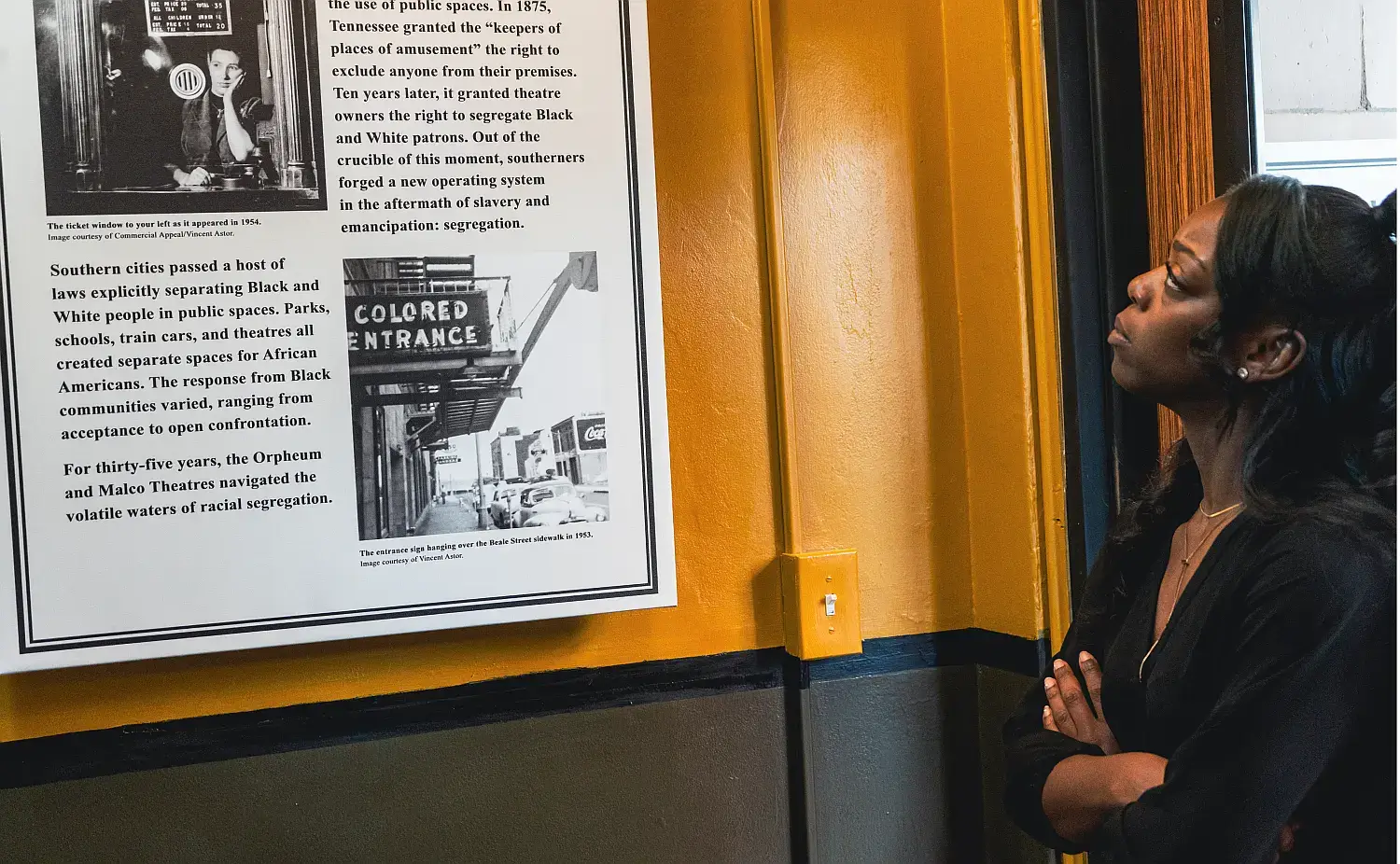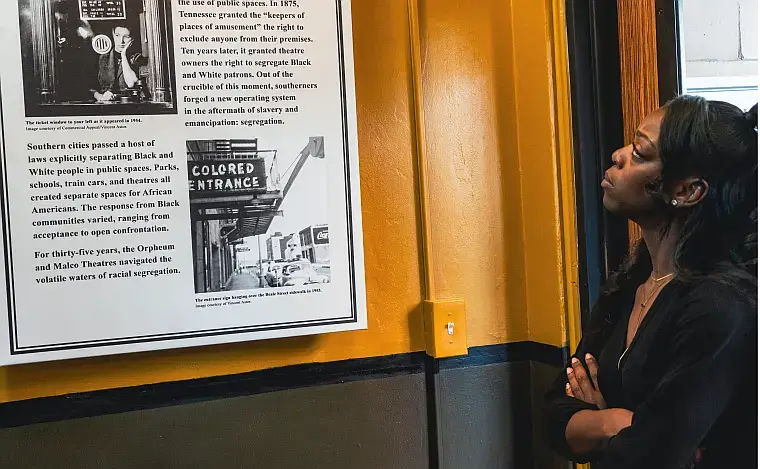
The Balcony Project at The Orpheum Theatre
By Sandi Butler Hughes
Photos submitted by Orpheum Theatre Group
The Balcony Project is an immersive time capsule, telling the story of segregation. Standing in the midst of history is an experience like none other. It gives context to a period that books, photographs, or films do not. The Balcony Project at the Orpheum Theatre is an intimate history lesson that allows visitors to step back in time and experience a dark period in our nation’s history.
During the Jim Crow era, the Orpheum, like many theaters across America, had "separate accommodations" for Blacks-only. The nondescript entrance on Beale Street opened to a small lobby with a box office and a staircase to the upper balcony, also for Blacks-only. Until opening as The Balcony Project, the space had been used for storage and remained relatively untouched until now.
Brett Batterson, President of the Orpheum Theatre Group, recognized the significance of the space and the opportunity to tell the story. “In 2016 when I came to the Orpheum and heard that the colored entrance still existed, I was intrigued. After Jim Crow, most theaters reclaimed the space to use for other things, and for whatever reason the Orpheum did not,” he said. “I knew this could be an important project to use for our education component.” Initially, he conceived The Balcony Project would be primarily for children because the differences are so striking, but once the project got underway he realized it is an opportunity for everyone to learn.
The Blacks-only lobby is a vast contrast to the opulence of the Orpheum’s lobby used today. “The paint used in the lobby is the same paint used in the janitorial closet in the basement backstage. That is how low the thought was in 1928,” Brett said. The separate entrance and lobby were designed was designed in the original architecture when the Orpheum opened in 1928, and it was closed in 1963 when the Orpheum was a Malco movie theater. For decades the space was little more than a forgotten relic and remained intact. Dr. Charles McKinney, a respected Civil Rights Movement historian and Associate Professor of History and Director of Africana Studies at Rhodes College, curated the panels used in the exhibition that explain that period in our history. In addition to the panels, a documentary video produced by filmmaker Daven Baptiste shares stories from Black patrons, teenagers at the time, who remember visiting the Orpheum and using the Blacks-only entrance.
“The Orpheum Theatre Group has used performing arts to educate for 95 years and is uniquely positioned to tell this story,” said Dr. McKinney. “The Balcony Project can make
significant contributions to historical recognition and understanding of the Jim Crow era, underscoring the Orpheum’s commitment to continuous learning.”
The Balcony Project is free to visit on Saturdays from 10am-noon and Mondays from 2-4pm. It is included on regularly scheduled tours and may be scheduled for group tours. orpheum-memphis.com
During the Jim Crow era, the Orpheum, like many theaters across America, had "separate accommodations" for Blacks-only. The nondescript entrance on Beale Street opened to a small lobby with a box office and a staircase to the upper balcony, also for Blacks-only. Until opening as The Balcony Project, the space had been used for storage and remained relatively untouched until now.
Brett Batterson, President of the Orpheum Theatre Group, recognized the significance of the space and the opportunity to tell the story. “In 2016 when I came to the Orpheum and heard that the colored entrance still existed, I was intrigued. After Jim Crow, most theaters reclaimed the space to use for other things, and for whatever reason the Orpheum did not,” he said. “I knew this could be an important project to use for our education component.” Initially, he conceived The Balcony Project would be primarily for children because the differences are so striking, but once the project got underway he realized it is an opportunity for everyone to learn.
The Blacks-only lobby is a vast contrast to the opulence of the Orpheum’s lobby used today. “The paint used in the lobby is the same paint used in the janitorial closet in the basement backstage. That is how low the thought was in 1928,” Brett said. The separate entrance and lobby were designed was designed in the original architecture when the Orpheum opened in 1928, and it was closed in 1963 when the Orpheum was a Malco movie theater. For decades the space was little more than a forgotten relic and remained intact. Dr. Charles McKinney, a respected Civil Rights Movement historian and Associate Professor of History and Director of Africana Studies at Rhodes College, curated the panels used in the exhibition that explain that period in our history. In addition to the panels, a documentary video produced by filmmaker Daven Baptiste shares stories from Black patrons, teenagers at the time, who remember visiting the Orpheum and using the Blacks-only entrance.
“The Orpheum Theatre Group has used performing arts to educate for 95 years and is uniquely positioned to tell this story,” said Dr. McKinney. “The Balcony Project can make
significant contributions to historical recognition and understanding of the Jim Crow era, underscoring the Orpheum’s commitment to continuous learning.”
The Balcony Project is free to visit on Saturdays from 10am-noon and Mondays from 2-4pm. It is included on regularly scheduled tours and may be scheduled for group tours. orpheum-memphis.com
Share The Balcony Project at The Orpheum Theatre from 4Memphis!

